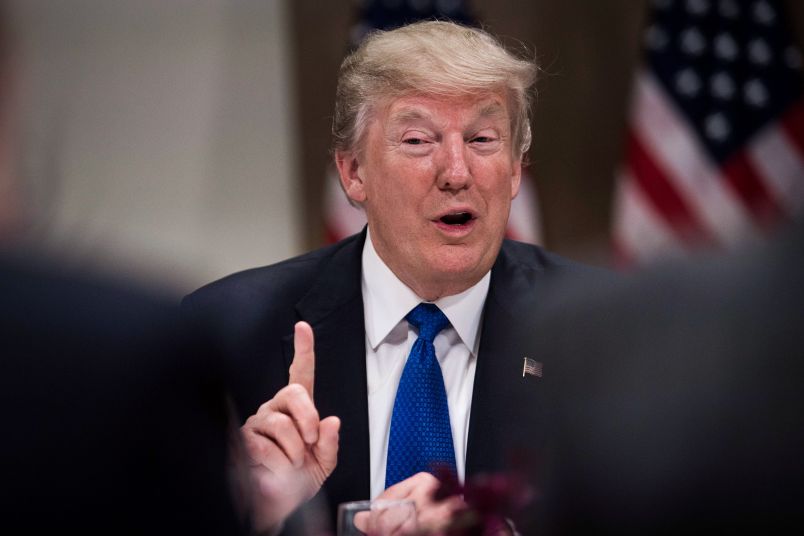Last week was a tremendously consequential week in the Trump/Russia investigation. This was so not simply because of the number of revelations but because each new revelation layered upon the previous one to confirm one overriding, consequential reality: a pattern and practice of obstruction of justice and abuse of office that didn’t end with the firing of James Comey on May 9 but continued right down to the present day, touching almost everyone in President Trump’s inner circle and beyond.
The key revelation was Mueller’s investigators’ interview with Attorney General Jeff Sessions – particularly their focus on Trump’s bullying of the AG in order to push him to resign and their interest in whether this was part of a pattern of conduct connected to Trump’s bullying and subsequent firing of James Comey. This was a major new clue about the nature and scope of the investigation. It was the first concrete evidence that the obstruction portion of the Mueller probe wasn’t limited to Comey’s firing and events which preceded it but continued unabated into Mueller’s tenure.
The Sessions news was followed by reports of interviews with other key administration officials. We learned that FBI Director Christopher Wray had threatened to resign over pressure to purge top FBI officials the White House viewed as Comey partisans. The pressure came from the President, the White House Counsel and most directly from the Attorney General himself. This was followed at the end of the week by the news that President Trump had already once tried to fire the Special Counsel, only weeks after his appointment and little more than a month after he fired the FBI Director. Here the player threatening to resign was the White House Counsel, Don McGahn, though that purported confrontation may be less clear cut than first advertised.
That was followed by this article which appeared late on Friday in Foreign Policy. It is not an easy article to wrestle to ground. But the central claim is, if accurate, a key one. We know from months of news and the revelations noted above that President Trump has been adamant that Director Wray ‘clean house’ at the FBI. According author Murray Waas, this was not simply to cleanse the Bureau of Comey’s influence. It was an effort to discredit top FBI officials who might become witnesses against President Trump because they had contemporaneous knowledge (via Comey) of his effort to derail the Russia probe. This moves the effort from a general demand to install loyalists to a specific effort to undermine and obstruct Mueller’s investigation.
Before last week we knew that one part of Mueller’s probe focused on obstruction of justice. But it seemed that the focus was on events which predated his appointment on May 17th. It now appears clear that Mueller is investigating Trump’s effort to impede and obstruct his investigation itself, a pattern of obstruction that continued at least down to the early weeks of January 2018. None of this is surprising in itself. Much of it has happened in the open, in plain sight. But Mueller has access to far more information than we do. He clearly believes these various actions are not just impulsive and inappropriate but may be part of a continuing pattern of illegal behavior. Indeed, as I argued here, it’s hard to see this pattern of conduct is clearly distinguishable from the efforts of Trump allies to manufacture nonsensical conspiracy theories for the similar purpose of blocking Mueller’s probe.
If we step back and look at the entire first year of Trump’s presidency, the clarity and consistency of Trump’s effort to use all the powers of the presidency to obstruct the Russia probe is remarkable. We start with demanding loyalty from the FBI director; next, he’s asking the Director to drop a key part of the probe; next he’s firing the Director; next he’s ordering the firing of the Special Counsel, the man who replaced the Director as the head of the probe; next he’s trying to bully the Attorney General into resigning so he can replace him with a loyalist who could reclaim control of the probe; intermixed with this he is demanding a purge of the men he believes are loyal to the FBI Director he fired to end the Russia probe; now we learn the President wanted them fired because they could testify against him.
When you piece the entire drama and storyline together it is remarkable for its consistency and creativity, prodding and poking and exploring every angle to use the presidency to protect himself and his associates and bosses from exposure and criminal jeopardy. Occasionally, his finger gets burned and he snaps back. But never for long. He’s back in days with a new angle.
One way to look at this is that the President not only sought to obstruct Comey’s investigation. He tried to obstruct the investigation when it continued under Mueller. That’s sure to inflame a career prosecutor who has been trained and acculturated to see obstruction as an attack on the law enforcement process itself. But a better way to look at it may be to see that Trump treated Mueller to six-plus months of what we might call obstruction of justice performance art, right in front of his face, that he could surveil, record and investigate in real time.
Trump is a lawless President. He has a moral disability which makes it extremely difficult for him to follow the law. His aides and staffers have been caught in a pitiful drama of alternatively trying to save him from himself and becoming complicit in his wrongdoing. Robert Mueller really does seem like his worst nightmare. Whether he knows it or not.






